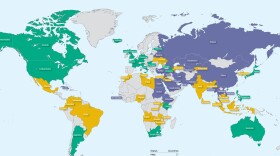
Alina Selyukh
Alina Selyukh is a business correspondent at NPR, where she follows the path of the retail and tech industries, tracking how America's biggest companies are influencing the way we spend our time, money, and energy.
Before joining NPR in October 2015, Selyukh spent five years at Reuters, where she covered tech, telecom and cybersecurity policy, campaign finance during the 2012 election cycle, health care policy and the Food and Drug Administration, and a bit of financial markets and IPOs.
Selyukh began her career in journalism at age 13, freelancing for a local television station and several newspapers in her home town of Samara in Russia. She has since reported for CNN in Moscow, ABC News in Nebraska, and NationalJournal.com in Washington, D.C. At her alma mater, Selyukh also helped in the production of a documentary for NET Television, Nebraska's PBS station.
She received a bachelor's degree in broadcasting, news-editorial and political science from the University of Nebraska-Lincoln.
-
Trump-style tweets from the Office of Government Ethics urging divestitures made many suspect a hack of this typically staid agency. New records shared with NPR show the author was the agency chief.
-
Winners of a ZTE crowdsource challenge proposed a phone that responds to eye movements and can be attached to surfaces for hands-free use. But picking a name posed an unexpected challenge.
-
Apple says it has "been informed" that the app violated local regulations. It's the latest in a long history of media restrictions in China, but also of tech companies getting involved in the efforts.
-
Arkansas police have served a warrant to Amazon looking for possible recordings from a murder scene. Privacy advocates have predicted a wave of cases involving smart home devices and gadgets.
-
A congressional hearing on the proposed $85.4 billion merger focused heavily on questions about the impact on consumer prices and how the companies might use their competitive advantage.
-
The shooting a year ago started a heated debate about government access to secured devices. As such access keeps getting more restricted, calls for "back doors" continue and questions remain.
-
In an odd sequence of events, the federal ethics watchdog praised Trump in a series of snarky tweets for allegedly deciding to divest his businesses — something he hasn't specifically promised.
-
It's a story of poor phone connections, suitcases full of Russian snacks, non-optional love of borsch and a globetrotting meat grinder.
-
Twitter has long faced criticism for its inability to curb harassment and threatening posts. It's now expanding options to flag abuse or avoid seeing offensive posts.
-
Apps like WhatsApp and Telegram are the latest to face crackdowns, a new report says. Two-thirds of Internet users live in countries that censor criticism of the government, military or rulers.









